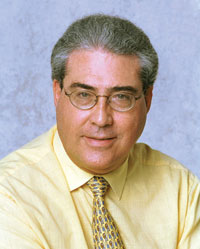|
Escotet named Frost Professor in College of Education
Miguel Ángel Escotet,
professor of International Development Education and Research and
director of the FIU International Institute of Educational Development,
was recently named the Patricia and Phillip Frost Professor in the
College of Education.
The Frost Professorship, established in 1991 by Philip and Patricia
Frost (the latter is a member of the FIU Board of Trustees and the
FIU Foundation Board of Directors), honors faculty members in the
College of Education who distinguish themselves and inspire excellence
in the college. Escotet plans to use the fellowship's funding in
support of two projects: the development of an online journal on
his "One World" education web site (www.fiu.edu/~escotet)
where graduate students can publish their works, and a symposium/fair
in Spring 2002 focusing on the issue of international development
education.
Escotet is recognized nationally
and internationally for his research, leadership and service in
the area of international development education, cross-cultural
psychology and higher education planning. He has been a university
professor since 1965, has taught in 13 countries, and has published
25 books. Escotet has served as president of Universidad Iberoamericana
de Postgrado of Salamanca, secretary general of the Iberoamerican
Organization of States in Spain, president of the National Open
University, vice minister of education of Venezuela, and vice president
of the Interamerican Human Rights Commission. Recently, Escotet
was elected a member of the Board of Directors (2001-04) of the
Comparative and International Education Society.
 |
|
Miguel Ángel Escotet
|
Escotet originally came
to FIU in 1981, to accept a faculty position in the College of Education
and serve as director of the Interamerican University Council for
Economic and Social Development. He left the University in 1983
to become secretary general of the Iberoamerican Organization of
States in Spain and subsequently served as president of Universidad
Iberoamericana de Postgrado de Salamanca and senior advisor in higher
education to the director general of UNESCO in Paris.
FIU Newsletter recently spoke to Escotet about his distinguished
career, the way in which his personal philosophy has informed his
work, and FIU's potential as a leader in international education.
Q: Are there any particular values
that have guided you through your more than 35 years in higher education?
A:
The first thing that inspired me to do what I do was an ethical
issue...in terms of helping people, especially when I experienced
the lack of intellectual freedom under the dictatorship of Spain
(where I was born) and I left for Venezuela. When I understood the
reality of Latin America, its strengths and weaknesses, I started
to have an interest in education, health sciences, social sciences
-- ways to help people reduce their suffering and to work against
discrimination of any kind.
That's why I was motivated to switch
from the field of engineering to psychology. Going from psychology
to education was a matter of determining what discipline to practice.
Education is a way to help people fight for their own rights, for
tolerance, for them to realize self-growth, in terms of affective
and cognitive domains. Education can also be a major process for
psychological development and self-realization.
Q: You've worked at high levels of government in Spain and as subsecretarygeneral
director of the Venezuela Ministry of Education. Did you plan to
move into the governmental ranks?
A:
I wasn't really interested in getting
into government. I was more interested in teaching, writing, research.
It exposed me to the abuse of power and the mediocrity of politics.
However, it was a good experience. It gave me the opportunity to
be involved in an educational revolution in Venezuela. We also developed
a scholarship program that sent 20,000 people around the world to
study at the best universities. I learned that my authentic life
is to feel and work as a regular citizen and as a permanent learner.
Learning to be!
Q: Given FIU's location and mission, do you think we can make a
major impact in international education?
A:
FIU is in a strong position to become
very influential in this area. However, FIU should not look at other
universities for a model; FIU can develop its own model of excellence.
In addition to developing more international and global programs,
we should promote greater international understanding, for solidarity
and helping others. Escotet named Frost Professor FIUprofile Miguel
Ángel
|
|

